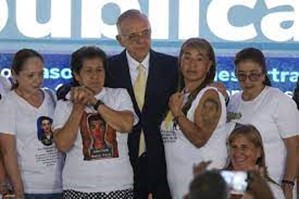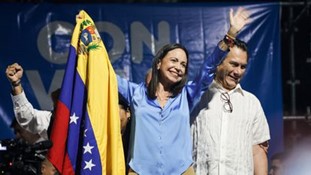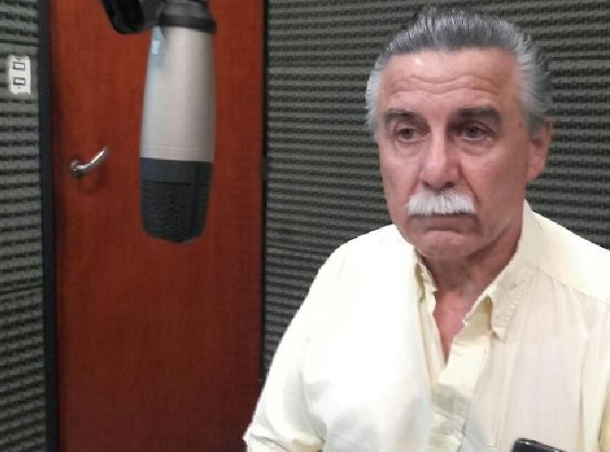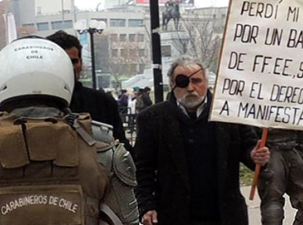This month we bring you news that:
- Colombia – Colombia’s Defence Minister has apologised to the families whose sons were wrongly killed by the military.
- Venezuela – The Supreme Court has suspended the results of October’s opposition primary election.
- Brazil – Amnesty’s Write for Rights 2023 campaign features Ana Maria Santos Cruz, who is fighting for justice for the killing of her son Pedro Henriquez by the police in the state of Bahia in 2018.
- Argentina – Human rights lawyer Alberto Nallar, subject of an Amnesty Urgent Action, has been sentenced to 3 years and 6 months in prison for crimes of “instigation to commit crimes and sedition.”
- Chile – An Amnesty Urgent Action calls on a regional prosecutor to act against impunity for human rights violations by police commanders.
- Peru – The UN has called on the authorities to undertake reforms to ensure that human rights are respected during demonstrations.
COLOMBIA

In a new gesture of reconciliation, Iván Velásquez, Colombia’s Minister of Defence, has apologised to the families whose sons were killed by the military and known as ‘false positives’. The transitional justice body (JEP) has found that over 6,000 young men were recruited by army units, killed and presented as guerrillas to gain rewards and comply with quotas set by the Army in its fight with FARC and other guerrillas.
AIUK´s Mayfair and Soho Group, who continue to act on behalf of the Peace Community of San José de Apartádo, received a letter from Admiral José Joaquín Amezquita García, head of the Joint Chiefs of Staff. He informed them that units of the 16th Brigade were acting to ‘mitigate the factors of instability which are present in the locality in the area which is inhabited by the beneficiaries of the Provisional Measures decreed by the Inter-American Court of Human Rights’. The decree was issued in 2018. This follows a visit from the Minister of Defence late last year.
16 October the Colombian government and the FARC-EMC reached an agreement for a 3-month ceasefire to 15 January 2024. These three months are to be used for talks to lead to a permanent peace. This is part of the government’s plan for ‘Total Peace’, which has to date yielded little relief for rural communities who find themselves in the crossfire of a conflict which never seems to end.
The UN’s Colombian Office for Human Rights found that more than 14,000 people were affected by the ongoing conflict in Colombia between 2 and 30 October. Over 6,000 were displaced, over 3,000 suffered some form of aggression and over 3,000 were confined and did not have access to humanitarian aid.
The UK NGO ABColombia reports on the humanitarian crisis in southern Bolivar department, which includes numerous indigenous communities. The Ombudsman explains in a video (subtitles in English) how the fighting between the ELN (National Liberation Army), FARC dissidents (not the same group as the EMC) and former paramilitaries/organised criminals known as the Clan del Golfo are in dispute for control of territory, illicit economies and extortion rackets and the impact on the region’s people.
El Pais (English) reports on the October regional elections that candidates from more traditional political backgrounds triumphed, led by Carlos Fernando Galán’s resounding victory in Bogotá. This is seen as a setback for President Petro, a former Mayor of Bogotá, and his coalition parties. Colombia Reports alleges that organised crime, called the ‘clans’, won control of the Caribbean region, which is the main area for the illegal processing and export of cocaine. They claim that politicians in five departments who won office are associated with drug cartels.
VENEZUELA

Venezuela’s top court has suspended the results of October’s opposition primary election, as reported in the Financial Times. The decision, which is widely believed to be under the influence of the Venezuelan government, comes despite Venezuelan President Nicolas Maduro promising to allow the opposition to choose its own leader. The court has demanded that the organisers hand over all documentation related to the vote, whilst the organisers have also been required to appear at the attorney-general’s office regarding a criminal probe into the primary.
Amnesty has released a statement raising concerns over a ‘policy of repression’ and the ‘widely reported possibility of arbitrary detentions’ in the aftermath of the suspension. Maria Corina Machado, the overwhelming winner of the opposition primary, has been under a political ban since June for allegedly committing fraud and tax violations. The decision has come despite a wider agreement having been reached between the government and the opposition to hold presidential elections in 2024, leading to the US announcing the lifting of sanctions on Venezuelan oil and gas.
The Venezuelan government also released five political prisoners as part of the deal, including Roland Carreno, a journalist and member of the opposition party Popular Will, who is also one of the nine individuals we have been campaigning for under our Urgent Action on arbitrary detentions. We continue to call for the other eight to be released; we are deeply concerned that two of the remaining eight, Emirlendris Benitez and Guillermo Zarraga, are suffering from grave health conditions and should receive immediate medical attention.
The Venezuelan authorities have claimed to have regained control over the Puente Ayala prison, after having also claimed to have regained the Tocoron and Tocuyito prisons, all three of which had been taken over by organised criminal groups. The non-governmental organisation, Observatorio Venezolano de Prisiones, has, however, denounced the government’s claims, stating that control has been regained through negotiated agreements with the leaders of the criminal groups who had taken over the prisons, with those leaders given time by the Venezuelan authorities to escape.
The Guyanese authorities have sought UN protection from Venezuelan claims to the oil-rich Essequibo region in Guyana. The Venezuelan authorities, who have called a referendum on whether or not to annex the region, claim that the region falls inside of Venezuela by virtue of the Essequibo river to the east of the region forming a natural frontier recognized at the time of independence from Spain. The Essequibo region makes up more than two thirds of Guyana and is estimated to be home to 125,000 residents.
BRAZIL

Amnesty UK launched its Write for Rights 2023 campaign on behalf of Ana Maria Santos Cruz, who is fighting for justice for the killing of her son Pedro Henriquez by the police in the state of Bahia in 2018. Pedro organised ‘Walks for Peace’, annual marches which brought people together to speak about police abuses primarily against Black communities. Although the officers were indicted for Pedro’s killing in 2019, they are still working and the trial has yet to begin. In 2022 the Brazilian police admitted to killing more than 6,000 mainly Black people. Please take action here.
President Lula vetoed key parts of Bill 2903, which would have dramatically limited the ability of Indigenous peoples to gain formal recognition of their ancestral territories. He vetoed sections which had already been declared unconstitutional by the Supreme Court. Amazon Watch reports that a Congresswoman, who had led the fight against the onerous provisions of the Bill, said “Our fight has always been for the total veto of the bill, which we consider an attack on Indigenous peoples, but nonetheless we consider this an important victory.”
Amazon Watch reports on the extraordinary efforts of the Munduruku indigenous community to take on the US agribusiness company Cargill which has a large operation in Brazil. ‘Cargill’s reckless practices drive an ever-expanding wave of deforestation, pollution, and violence against local communities like the Munduruku.’
ARGENTINA

On 24th October human rights lawyer Alberto Nallar was sentenced to 3 years and 6 months in prison for crimes of “Instigation to commit crimes and sedition.” Alberto Nallar had been arrested on 13th July following the peaceful protests in Jujuy Province; there has been an Amnesty International Urgent Action calling for charges against him to be dropped since then. As well as being active in the protests, Alberto had provided support and legal assistance to people detained during the mobilizations and their families.
Meanwhile Amnesty International released its preliminary findings following a research mission to Jujuy in September. Ana Piquer, Americas director at Amnesty International, announced:-
“We have found that the Jujuy provincial police responded with indiscriminate use of force against those protesting for their rights. Our investigation indicates that the provincial authorities have created a hostile environment that inhibits the people of Jujuy from exercising their right to peaceful protest.”
Many of the victims interviewed by Amnesty International who had suffered physical injuries reported facing resistance and even denial of medical care at more than one public hospital in the province. The delegation also heard multiple accounts of arrests of individuals for simply participating in the demonstrations, which constitutes an arbitrary measure of deprivation of liberty.
CHILE

The Urgent Action demanding an end to impunity can be worked on till 27th November. It’s on the AIUK website (ignore the “0 days left to take action”). 4 years ago, peaceful protests throughout Chile were heavily repressed by the Carabineros. At the end of last year, the National Prosecutor’s Office had brought charges in only 127 of the 10,568 complaints of human rights violations during the period of social unrest, resulting in 27 convictions and eight acquittals. No police commanders have been held accountable.
Amnesty International has just launched a new report entitled Reform to move forward. Recommendations to reform Carabineros from a human rights perspective (the report is only in Spanish). It explains the need for in-depth reform of the Carabineros through regulatory and cultural change. Amnesty International has repeatedly warned that the military nature and organizational structure of the Carabineros constitute a major limitation to the performance of its functions, as was reflected in the widespread human rights violations committed during the social protests of 2019.
The UN Special Rapporteur on torture and other cruel, inhuman or degrading treatment or punishment, Alice Jill Edwards, has just conducted an official visit to Chile. She praised Chile for human rights progress since the fall of the country’s dictatorial regime in 1990 but cautioned against complacency. She examined efforts made to reform crowd control operations and weapons used by the Carabineros. Ms Edwards called on the Government to go even further to ensure that law enforcement officers use only single shot (crowd control) weapons. Buckshot or other lead-based rubber bullets also need to be withdrawn.
PERU

The UN Human Rights Office has called on the Peruvian authorities to undertake meaningful reforms to ensure the exercise of human rights in the context of demonstrations, continue accountability efforts and enable a decentralised and inclusive national dialogue. The report analyses the conduct of security forces during nationwide protests, focusing on those that took place between December 2022 and March 2023. It concludes that Peruvian authorities unduly restricted demonstrators’ human rights.
All the best,
South America Team – Richard Crosfield (Colombia and Brazil), David Rogers (Argentina and Chile), James Baird (Venezuela) and Graham Minter (rest of South America). And please don’t forget that you can follow us on our Facebook page and Twitter.